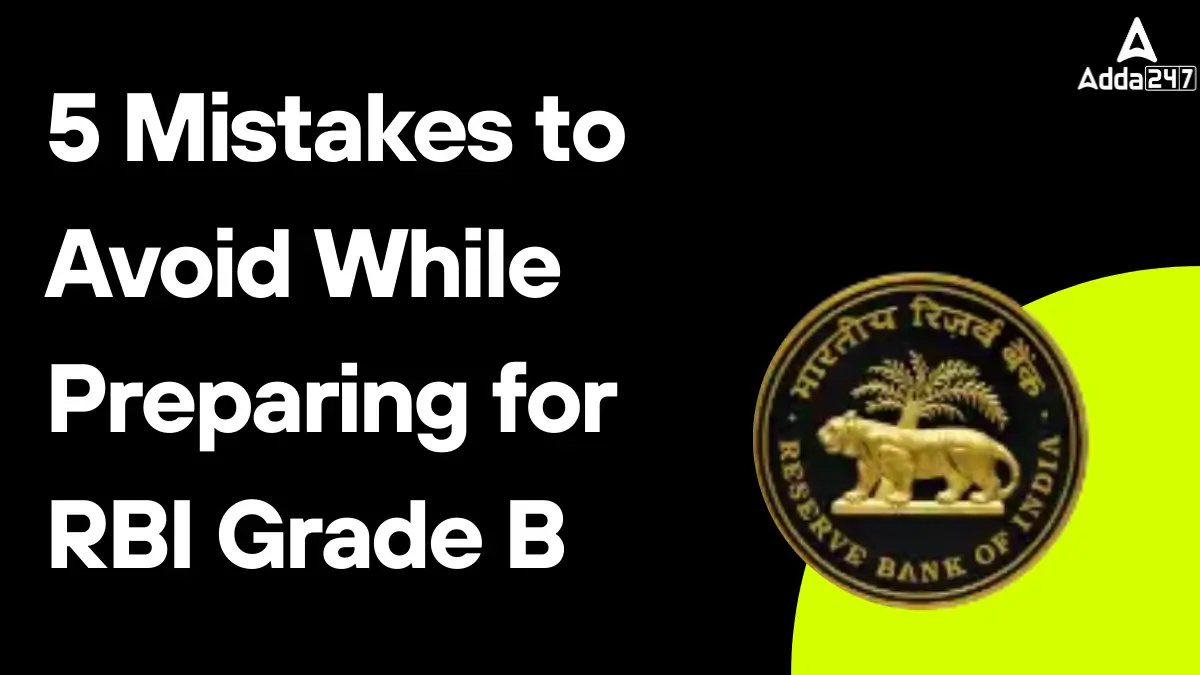Table of Contents
The RBI Grade B is one of the most competitive exams in all of the banking sector. Every year thousands of aspirants apply for this exam. But only a few make it to the final selection. One of the key reasons for many candidates failing over and over again is making some key avoidable mistakes while preparing for the exam. Now, what are those mistakes? Let’s find out.
5 Mistakes to Avoid While Preparing for RBI Grade B
Preparing for the RBI Grade B exam requires a strategic approach, and even small mistakes can impact your chances of success. Many aspirants focus solely on Quantitative Aptitude and Reasoning, neglecting the crucial General Awareness and Economic & Social Issues (ESI) sections. Ignoring the RBI’s official reports like the Economic Survey and Financial Stability Report is another common error. Additionally, inconsistent answer writing for the Descriptive Paper, lack of mock test analysis, and poor time management can hinder your performance. Here are the 5 Mistakes to Avoid While Preparing for RBI Grade B.
Mistake 1: Starting the Preparation 1 or 2 Months Before the Exam
Many aspirants underestimate the difficulty level of the RBI Grade B exam and start their preparation just a couple of months before the exam. Given the vast syllabus and depth of topics, this is a critical mistake. Short-term preparation might work for exams with limited topics, but RBI Grade B’s syllabus is very vast and requires a well-structured and consistent effort.
Solution
- It is recommended to Start your preparation at least 6-8 months in advance to cover all subjects in depth.
- Break your preparation into phases: first focus on building concepts, then move to practice, and finally, revision.
- Ensure that the last 1-2 months are reserved exclusively for mock tests, revision, and fine-tuning weak areas.
Mistake 2: Relying on One Source of Preparation
Some candidates depend entirely on one study material or a single book, thinking it will cover everything. While it might be helpful in clearing your basics. But, relying on just one source may leave gaps in your knowledge. RBI Grade B demands a multi-dimensional approach to score high. This requires the candidate to incorporate other tools of preparation and establish harmony between those different tools.
Solution
- Diversify your study resources by including online courses and study materials
- Incorporate reading newspapers like The Hindu and The Indian Express
- Include mock tests in your preparation to make it more effective.
Mistake 3: Studying Without a Proper Plan
Many aspirants don’t make a study plan while preparing for the exam and start to study randomly, having a proper study plan is a very important step of preparation and not having a study plan will cause candidates to not know which subjects or topics require how much time to prepare and will cause mismanagement leading to neglecting key subjects or rushing through topics and not understanding the topic in depth. Without a proper preparation plan, a candidate will get overwhelmed and stressed.
Solution
- Study the syllabus carefully to understand what topics and what subjects you have to prepare.
- Design a detailed study plan that allocates time to each subject based on its weightage.
- Set weekly and monthly goals and ensure that you dedicate time to revision and mock tests to reinforce learning.
- Keep track of your progress and make adjustments when necessary.
Mistake 4: Focusing on Low-Weightage Topics
Aspirants often make the mistake of spending too much time on low-weightage topics, this leaves less preparation time for high-weightage topics and this might leave them unprepared or underprepared. This results in low overall marks, even if they perform well in those less significant topics. While all topics should be covered, allocate more time to high-scoring areas to improve your overall performance.
Solution
- Analyze previous year question papers to identify high-priority topics.
- Give more time to subjects or topics that need more time to practice.
Mistake 5: Not Practicing Enough Mock Tests
Many candidates study well but fail repeatedly due to not testing themselves under exam conditions. Not practising mock tests enough results in poor time management, lack of knowledge and accuracy, stressful situations in the exam, and surprises during the exam. Without adequate practice, even well-prepared aspirants struggle to apply their knowledge effectively in a time-bound manner.
Solution
- Choose the right mock test that closely matches the real exam in terms of both the interface and quality of questions.
- Take one full-length mock test per week in the initial months and gradually increase the frequency closer to the exam.
- Attempt sectional tests to improve speed and accuracy in individual subjects.
- Analyze each mock test thoroughly review mistakes, identify weak areas, and work on improving them.
Pro Tips to Speed Up the Preparation Process
These pro tips will help aspirants speed up their preparation process and prepare more topics efficiently and effectively in less time.
- Strengthen Your Conceptual Understanding: Candidates should focus on strengthening their basic concepts first rather than jumping to more advanced topics. Having a good understanding of the basics helps in grasping the advanced concepts faster and easier.
- Use Smart Revision Techniques: Avoid spending hours re-reading lengthy study material. Using quick revision techniques like flashcards & writing down key takeaways in your own words and explaining concepts to yourself will improve long-term retention.
- Enhance Speed with Shortcuts and Tricks: Using shortcuts and short tricks will help candidates solve questions in less time. For Quantitative Aptitude, focus on mental math techniques, shortcut formulas, and approximation methods to speed up calculations. For Logical Reasoning, practice recognizing patterns quickly to solve puzzles and seating arrangements efficiently.
- Optimize your Study Routine: Instead of studying for long hours with low efficiency, candidates can divide their study time into focused sessions to stay energized and not feel overwhelmed.
- Focus on Quality Over Quantity: While it is important to incorporate multiple resources into your preparation. The quality of the resources can’t be overlooked. It is also important to gather a few high-quality resources rather than a high quantity of low-quality resources. A deep understanding of limited material is always more beneficial than superficial coverage of multiple sources.




 GA Capsule for SBI Clerk Mains 2025, Dow...
GA Capsule for SBI Clerk Mains 2025, Dow...
 The Hindu Review October 2022: Download ...
The Hindu Review October 2022: Download ...
 Rajasthan Gramin Bank Formed after Merge...
Rajasthan Gramin Bank Formed after Merge...


